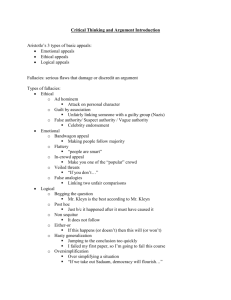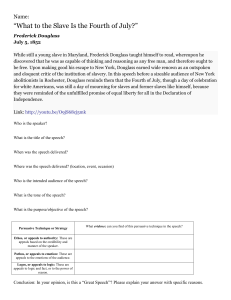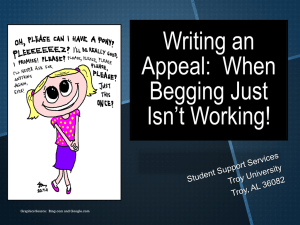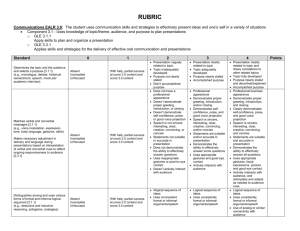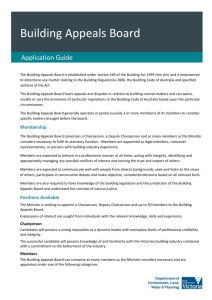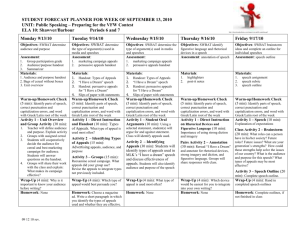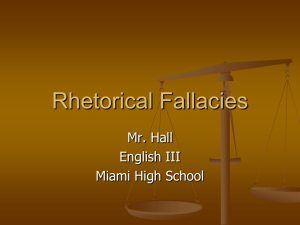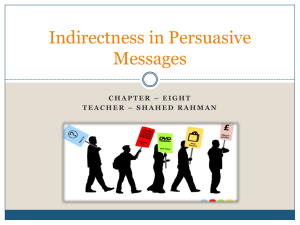Logical Fallacies: How to spot poor arguments
advertisement
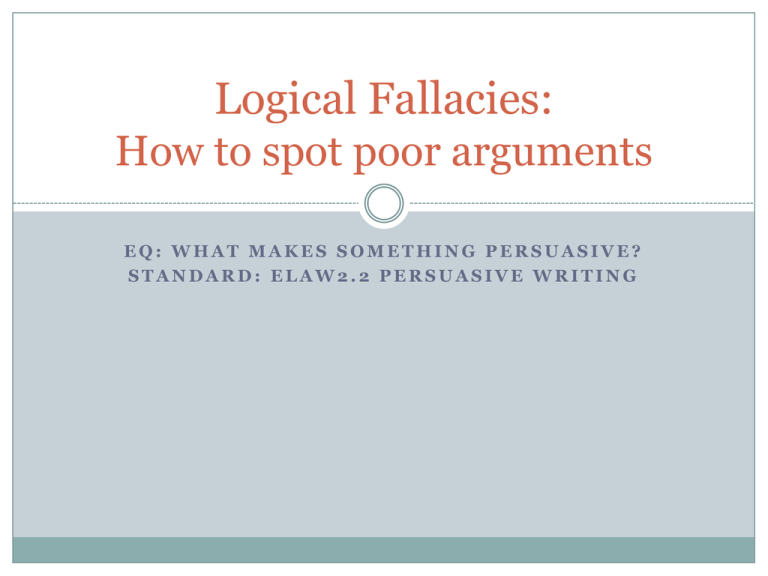
Logical Fallacies: How to spot poor arguments EQ: WHAT MAKES SOMETHING PERSUASIVE? STANDARD: ELAW2.2 PERSUASIVE WRITING Last class we talked about logical appeals, emotional appeals, and ethical appeals. Who can tell me what they are? Logical appeals= logos Emotional appeals= pathos Ethical appeals= ethos When a speaker/writer uses ethos, pathos, or logos, he/she may also use a logical fallacy intentionally or not. Logical fallacies are illogical statements someone uses in an argument. They can be sneaky, so watch out for them! Group 1 Double Talk Definition: nonsense, rambling, ambiguity, or elaboration of the obvious Example: The cat, which is a domesticated version of wild felines, is feline-like. This is double talk because it only repeats what a cat is, which everyone already knows. It elaborates on the obvious and doesn’t really prove anything. Complex Question Definition: asking a question containing one or more unproven assumptions and expecting a simple answer. Example: Why are you so lazy? This is a complex question because it assumes the other person is lazy even though nothing has been proven. Also, there may be many reasons why a person is appears to be lazy, so a simple answer won’t work! False Analogy Definition: A comparison of things that should not be used because they differ too much or a comparison that is made in an unfair way. Example: Guns are like hammers--they're both tools with metal parts that could be used to kill someone, yet it would be ridiculous to restrict the purchase of hammers. Therefore, restrictions on purchasing guns are equally ridiculous. While guns and hammers do share certain features, these similarities are not the ones at stake in deciding whether to restrict guns. Oversimplification Definition: Based on too little evidence or evidence that ignores exceptions Example: My math test was hard, and my Spanish test was hard. Therefore, all tests are hard. This is an overgeneralization because it ignores the fact that some tests are not hard and all people may not feel the same way the speaker does. Question Begging Definition: Assuming that you have already proven what you set out to prove or using a statement to prove itself. Example: Euthanasia is morally acceptable. It is a decent, ethical thing to help another human being escape suffering through death. The arguer has really just said the same thing twice: "decent, ethical" means pretty much the same thing as "morally acceptable," and "help another human being escape suffering through death" means "euthanasia." The arguer hasn't yet given us any real reasons why euthanasia is acceptable. Argument Ad Hominem Definition: attacking a person associated with the issue instead of the issue itself Example: Kenny Powers would make a bad governor because he cheated on his girlfriend. Regardless of what Mr. Powers does, attacking his personal mistakes has nothing to do with his abilities as a governor. Group 2 Bandwagon Effect (Also called appeal to popularity) Definition: Encourages listeners to act or think a certain way because everyone else is Example: The student council, the football team, and the cheerleaders all think the dress code should change. You should too. Just because a lot of people agree on the dress code does not mean that their opinions are correct or that the listener should agree with them. Atmosphere Effect Definition: A false statement is assumed to be true just because it is introduced along with true statements. Example: If you want to save money, look cool, and wear brand-name fashion, then shop at Macy’s! This statement doesn’t tell whether or not Macy’s will actually save you money, make you look cool, or sells brand-name fashion. Guilt by Association Definition: Someone’s qualities are assumed based on the people that person associates with Example: Ariel hangs out with the lazy students, so she must be lazy too. This doesn’t prove what Ariel is like at all. It only shows who her friends are. Poisoning the Well Definition: evidence is disallowed because its source is questionable. Example: That can’t be true if you read it in Star Magazine. This isn’t fair because even though Star Magazine can print many untrue things, it doesn’t mean that everything it prints is a lie. Hypothesis Contrary to Fact Definition: When someone starts speculating from a false assumption. Example: If you had done your homework, you would have passed the test. While it is reasonable to say that doing the homework would have helped, it does not mean that the student would have automatically passed the test. Confusing What Should Be with What Is Definition: Desire is confused with reality Example: My wallet isn’t lost; I saw it here yesterday! Even though your wallet was in a certain place a day ago, it does not mean that it will be in the same place again today. You wish your wallet were in the same spot, but it isn’t. Now You will read the following persuasive texts from the American Revolution: Read the excerpt from The Crisis by Thomas Paine (p.87-91) Read the excerpt from The Declaration of Independence by Thomas Jefferson (p.97-103) There will be a quiz and class work over these selections next class, so read thoroughly! *See if you can find any logical fallacies in either of these texts as you read!
